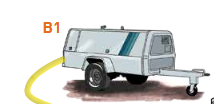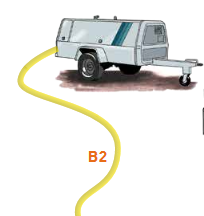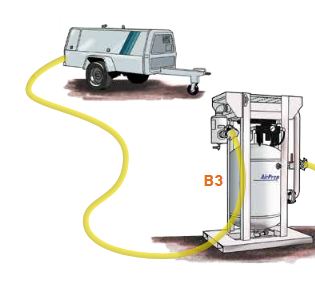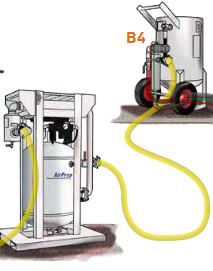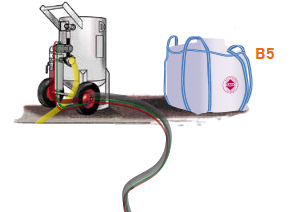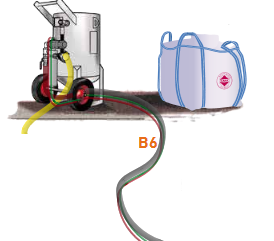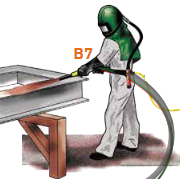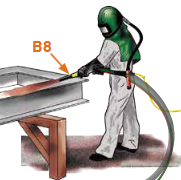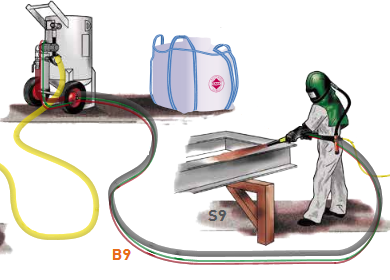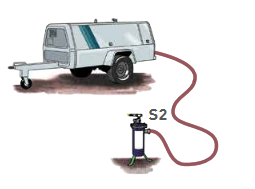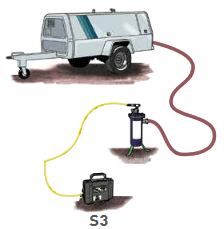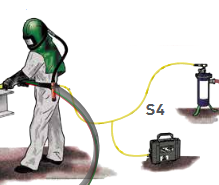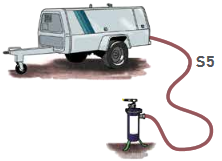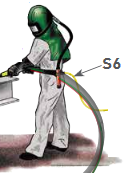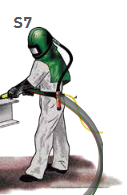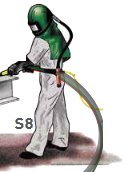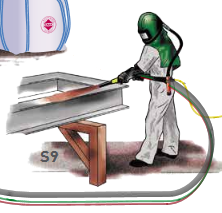Superior know how
Abrasive Blasting System: Daily Component Checklist
B1 Air Compressor
- Fully maintained, serviced and fueled
- Located upwind and away from blasting area
B2 Blast Air Supply Hose
- Large bore hose (4 times nozzle orifice minimum)
- Large connector fittings with whipchecks and/or safety chains installed
- Coupling gaskets in place
- Coupling pins fitted
B3 Air Moisture Control
- Condensate drained and air motor lubricant filled
B4 Blast Machine
- Handle and twinline free from leaks
- Abrasive metering valve cleaned, fittings checked/maintained
- Lid and screen (portable hoppers) fitted
- Blast outlet gasket checked
- Test pressure relief valve
B5 Blast Abrasive
- Kept dry and protected
- Certificates and batch numbers recorded
B6 Blast Hose
- Kept as straight and as short as possible (drawn curved to show perspective) –checked daily for wear or soft spots
- Coupling gaskets in place
- Coupling pins fitted
- Whipchecks installed
- Check gasket and components for wear, and air leaks
- Certificates and batch numbers recorded
B7 Remote Control Handle
- Checked operation for fast start/stop
- Deadman operating and safety latch in place
B8 Blast Nozzle
- Checked routinely for air pressure and liner/thread wear or damage
- Check nozzle pressure
- Check nozzle size for wear
- Nozzle gasket in place (where applicable)
B9 Deadman Hose
- Check fittings
- Check hose for pin holes or cracks
Operator Safety Checklist
S1 Breathing Air Source
- Check replacement date on inlet filter
- Checked and maintained on a regular basis
- Located in a clean air atmosphere, upwind and away from the blast area and engine exhaust fumes
S2 Breathing Air Filter
- Check replacement date on filter
- Cartridges require regular programmed replacement
- Pressure gauge in place and operating
- Filters and regulates the breathing air supply
- Test pressure relief valve
S3 Carbon Monoxide Monitor or Converter Monitor
- Checked, tested and calibrated (calibration certificate on file)
- Batteries checked
S4 Breathing Air Line
- Fitted with threaded screw-type connector or AS 1715 approved ‘Safety Type’ coupling with two distinct actions required for disconnection
- Free from kinks, abrasion
S5 Airline Breathing Air
- Airline for maximum airflow 1″ or C\v”
- Coupling gaskets in place
- Coupling pins fitted
S6 Fatigue Management and Noxious Gas Protection
- Air temperature control within 15°C – 25°C range for operator comfort
- Suitable Personal Gas Monitor
S7 Blast Helmet (Respirator)
- Inspected and maintained for wear and tear to the cape, collar, head gear and visor as per AS 1715 requirements
- New/clean inner and outer lens in place
- Inner lens in place for impact protection
- Helmet sanitized between operators
- Supplied with minimum 170 liters/minute breathing quality air as per AS 1715
S8 Other Protective Clothing
- Safety footwear
- Ear plugs and blasters gauntlets
- Glasses
S9 Work Hazards
- Check, control and eliminate wherever possible:
- Physical dangers – tripping, falling, crushing
- Toxic substances e.g. lead, arsenic, cyanide, heavy metals, chromates, free silica, etc. present either in the abrasive, the coating, the substrate or the environment
S10 Warning Signs and Barriers
- On display and not obstructed
- Site specific PPE signs displayed and not obstructed
- Personnel barriers in place

DISCLAIMER: The above information is only a guide and does not represent nor claim to be either a full or complete or accurate nor an approved or standard method of checking blast cleaning equipment or components. It is the responsibility of the reader and/or users of this information to separately determine and verify each and/or any guideline, regulations, tests, checks, etc. for equipment and/or setup as directed or indicated or required in or by any work specifications and/or standards. BlastOne expressly disclaims any liability for the use or misuse of the above information.
 My Account
My Account

